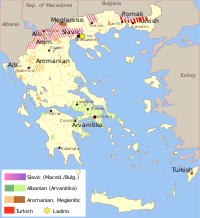| Saloniki Dialect | |
|---|---|
| Dialecto de Saloniko | |
 | |
| Native to | Greece |
| Region | Thessalonika |
Native speakers | 10,000 |
Indo-European
| |
Early form | |
| Language codes | |
| ISO 639-3 | – |
Name
The dialect's name comes from the name of the city of Thessalonika or Salonika.
Linguistic Description
The Saloniki Dialect is the dialect of Ladino most similar to Old Spanish. Unlike other dialects of Ladino spoken in Greece letters /o/ and /e/ do not become /u/ and /i/ when unstressed. Furthermore Saloniki Ladino preserves the Spanish fricative /ð/ represented by /ד'/ and the <f> in the beginning words such as in <fermoza> Modern Spanish <hermoza> and <fijo> Modern Spanish <hijo>. The number of Jews in Thessaloniki was so big that not only did the majoruity of Jews speak Ladino but many of the other ethnic groups including the Greeks, Bulgarians, Turks, and even Albanians in the city spoke Ladino.
Spoken Area
The Saloniki dialect was not only spoken in the city of Salonika but was spoken up to Thessaly and in Greek Macedonia.
| Saloniki Dialect | |
|---|---|
| Dialecto de Saloniko | |
 | |
| Native to | Greece |
| Region | Thessalonika |
Native speakers | 10,000 |
Indo-European
| |
Early form | |
| Language codes | |
| ISO 639-3 | – |
Name
The dialect's name comes from the name of the city of Thessalonika or Salonika.
Linguistic Description
The Saloniki Dialect is the dialect of Ladino most similar to Old Spanish. Unlike other dialects of Ladino spoken in Greece letters /o/ and /e/ do not become /u/ and /i/ when unstressed. Furthermore Saloniki Ladino preserves the Spanish fricative /ð/ represented by /ד'/ and the <f> in the beginning words such as in <fermoza> Modern Spanish <hermoza> and <fijo> Modern Spanish <hijo>. The number of Jews in Thessaloniki was so big that not only did the majoruity of Jews speak Ladino but many of the other ethnic groups including the Greeks, Bulgarians, Turks, and even Albanians in the city spoke Ladino.
Spoken Area
The Saloniki dialect was not only spoken in the city of Salonika but was spoken up to Thessaly and in Greek Macedonia.